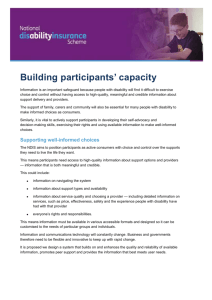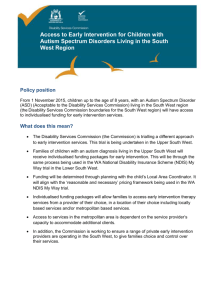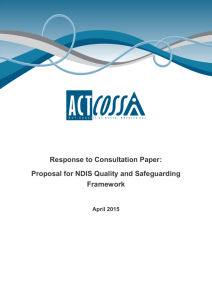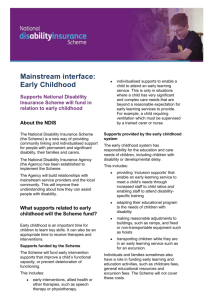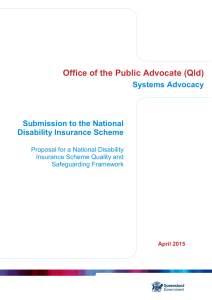Safeguards and the NDIS
advertisement
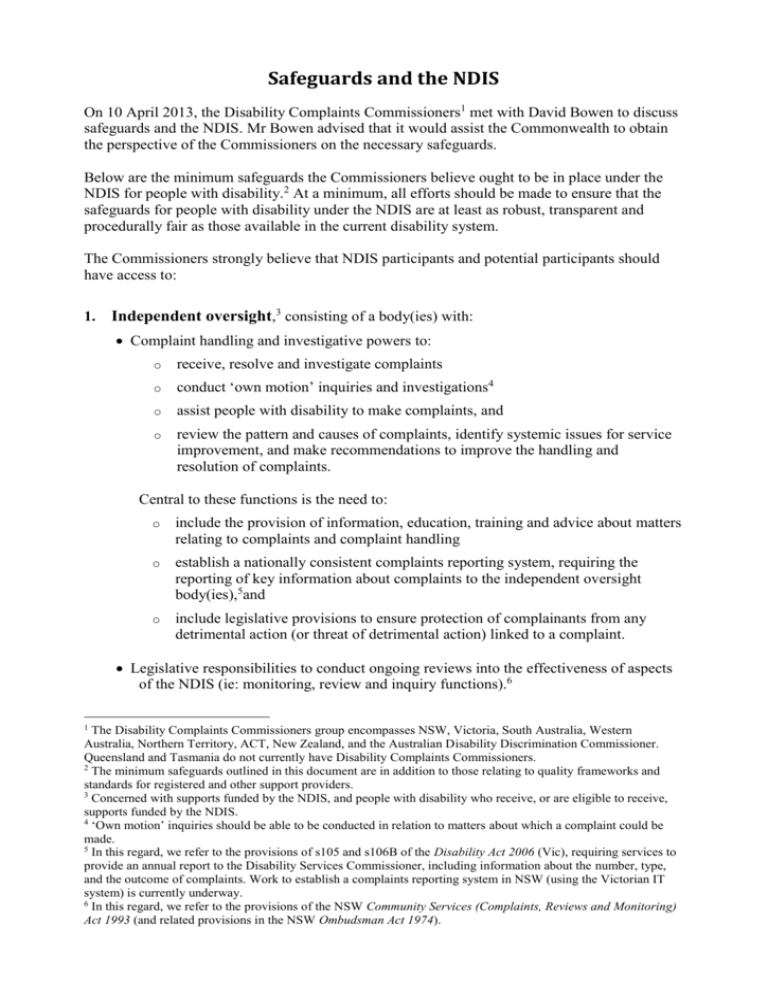
Safeguards and the NDIS On 10 April 2013, the Disability Complaints Commissioners1 met with David Bowen to discuss safeguards and the NDIS. Mr Bowen advised that it would assist the Commonwealth to obtain the perspective of the Commissioners on the necessary safeguards. Below are the minimum safeguards the Commissioners believe ought to be in place under the NDIS for people with disability.2 At a minimum, all efforts should be made to ensure that the safeguards for people with disability under the NDIS are at least as robust, transparent and procedurally fair as those available in the current disability system. The Commissioners strongly believe that NDIS participants and potential participants should have access to: 1. Independent oversight,3 consisting of a body(ies) with: Complaint handling and investigative powers to: o receive, resolve and investigate complaints o conduct ‘own motion’ inquiries and investigations4 o assist people with disability to make complaints, and o review the pattern and causes of complaints, identify systemic issues for service improvement, and make recommendations to improve the handling and resolution of complaints. Central to these functions is the need to: o include the provision of information, education, training and advice about matters relating to complaints and complaint handling o establish a nationally consistent complaints reporting system, requiring the reporting of key information about complaints to the independent oversight body(ies),5and o include legislative provisions to ensure protection of complainants from any detrimental action (or threat of detrimental action) linked to a complaint. Legislative responsibilities to conduct ongoing reviews into the effectiveness of aspects of the NDIS (ie: monitoring, review and inquiry functions).6 1 The Disability Complaints Commissioners group encompasses NSW, Victoria, South Australia, Western Australia, Northern Territory, ACT, New Zealand, and the Australian Disability Discrimination Commissioner. Queensland and Tasmania do not currently have Disability Complaints Commissioners. 2 The minimum safeguards outlined in this document are in addition to those relating to quality frameworks and standards for registered and other support providers. 3 Concerned with supports funded by the NDIS, and people with disability who receive, or are eligible to receive, supports funded by the NDIS. 4 ‘Own motion’ inquiries should be able to be conducted in relation to matters about which a complaint could be made. 5 In this regard, we refer to the provisions of s105 and s106B of the Disability Act 2006 (Vic), requiring services to provide an annual report to the Disability Services Commissioner, including information about the number, type, and the outcome of complaints. Work to establish a complaints reporting system in NSW (using the Victorian IT system) is currently underway. 6 In this regard, we refer to the provisions of the NSW Community Services (Complaints, Reviews and Monitoring) Act 1993 (and related provisions in the NSW Ombudsman Act 1974). Responsibility for promoting access to advocacy and supported decision-making. 2. Safeguards to prevent and effectively respond to abuse, neglect and exploitation – including: development of a comprehensive national framework for preventing, identifying and effectively responding to abuse, neglect and exploitation of people with disability a requirement to report critical incidents7 [with oversight of the handling of matters by an independent oversight body(ies)] the introduction of a consistent national system for screening people engaged to support people with disability under the NDIS, using a comprehensive clearance and bar model8 the introduction of an ‘unconscionable conduct’ (or exploitation) offence,9 and regulation and effective oversight of the use of restrictive interventions.10 3. Community Visitors At a minimum, we consider that Community Visitors should be available to people with disability living in residential care funded under the NDIS, given their relative vulnerability.11 4. Public Guardian/ Public Advocate We would also expect that the national system would incorporate the best aspects of the public guardian/ public advocate roles, in the context of a person-centred approach.12 5. Disability Advisory Council(s) We recognise the importance of an advisory council(s) that represents people with disability. 7 Critical incidents would include alleged sexual offences or sexual misconduct, physical assaults, serious neglect or ill-treatment, and fraud. 8 This model is largely consistent with the probity checking arrangements in place in the ACT and Queensland under the Working With Vulnerable People (Background Checking) Act 2011 (ACT), and the Disability Services Act 2006 (Qld). However, these systems would be enhanced by ensuring that adverse findings from the proposed critical incidents reporting system are factored into the screening (and related risk management) system. 9 The creation of an offence for exploiting people with disability would serve as a ‘safety net’ for all service delivery arrangements, including those that will fall outside of the safeguards proposed for providers registered under the NDIS. 10 Restrictive interventions include chemical, mechanical and physical restraint, and seclusion. 11 There would be merit in committing to ongoing dialogue between relevant stakeholders regarding the scope for expanding the Community Visitor scheme to potentially include other kinds of care arrangements that will emerge under the reform agenda. We consider that there is also likely to be an important and increasing role for ‘independent persons’ more generally under the NDIS, particularly where the person with disability does not have an informal support network, or where there are higher levels of vulnerability and/or risk involved. For example, the use of independent persons who could: visit people with disability in the community, where the planning process identifies this need; discuss proposed restrictive interventions (and the person’s rights) with the person with disability and report where the person does not understand or legislative requirements are not being met; and provide supported decision-making assistance. 12 Important aspects include substitute decision-making, investigating complaints or allegations that a person is under inappropriate guardianship or is being exploited or abused or in need of guardianship, and promoting the development of the ability and capacity of persons with disability to act independently. 2

